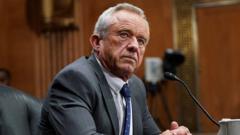RFK Jr.'s nomination for US health secretary has passed a critical Senate committee vote, setting the stage for further confirmation challenges ahead.
RFK Jr Moves One Step Closer to Senate Confirmation as Health Secretary

RFK Jr Moves One Step Closer to Senate Confirmation as Health Secretary
Robert F. Kennedy Jr. garners Senate committee approval amid partisan divisions, as he prepares for a full Senate vote.
Robert F. Kennedy Jr. has successfully navigated a significant milestone in his path to being confirmed as the United States Secretary of Health. On Tuesday, a Senate committee approved his nomination with a narrow vote of 14-13, reflecting a clear partisan split. All Republican committee members backed Kennedy, a vaccine skeptic and former presidential candidate who endorsed Donald Trump after exiting the race.
The nomination now advances to the broader Senate for a vote, where Republicans hold a slight 53-47 majority. During his confirmation hearings, Kennedy faced rigorous questioning regarding his viewpoints on vaccines, as well as his knowledge of the U.S. public health system. He clarified his stance, stating he does not oppose vaccines but advocates for enhanced safety testing. Nonetheless, senators challenged Kennedy on prior remarks that suggest skepticism regarding vaccine safety and efficacy.
Prominent independent Senator Bernie Sanders, while acknowledging Kennedy's health campaign slogan, "Make America Healthy Again," raised concerns over merchandise sold by Kennedy's former organization, Children's Health Defence, which features anti-vaccine messages. In response, Kennedy claimed he no longer governs the group.
Despite his testimony failing to sway any Democratic votes, he secured crucial backing from Louisiana's Republican Senator Bill Cassidy, who, a practicing doctor, had shown initial doubts about the nominee but later stated he received significant commitments from Kennedy and the Trump administration. This development paves the way for Kennedy to face a full Senate vote.
Kennedy, a prominent environmental lawyer and public health critic, has proposed sweeping changes to the U.S. healthcare landscape, indicating plans to dismiss several agency officials if confirmed. His potential role would oversee significant health entities, including the CDC, FDA, NIH, and CMS. While he clarified he doesn't aim to ban vaccines or fast food entirely, he expressed concern about food additives more prevalent in American products compared to European ones, indicating a reformist agenda on health.





















